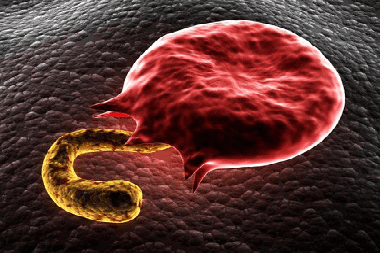Infectious diseases >>>> Malaria - signs and treatment
Malaria - signs and treatment.

Malaria is a vector - borne infection caused by parasites of the genus Plasmodium and transmitted to humans when bitten by a female Anopheles mosquito that carries the parasite. The most important mosquitoes that transmit malaria bite at dawn or dusk. The intensity of transmission of infection depends on the climatic zone and the period of high humidity, creating favorable conditions for the reproduction of mosquitoes.
When bitten by a mosquito during pregnancy, there is a risk of intrauterine malaria in the fetus.
Depending on the type of causative agent of the disease, symptoms, forms of the course of the disease and the prognosis of recovery differ.
The most dangerous forms of malaria are caused by Plasmodium falciparum (about 90% of cases) - tropical malaria - which has dangerous complications and a high percentage of deaths, and Plasmodium vivax - causes three-day vivax malaria.
Plasmodium malariae causes four-day malaria.
Oval malaria is caused by Plasmodium ovale.
Signs of malaria (7-16 days after the bite):
- chills, fever appear;
- headache;
- nausea, vomiting;
- muscle and / or joint pain;
- further increases the viscosity of the blood;
- anemia develops;
- the liver and spleen increases in size;
- acute renal failure develops;
- respiratory failure appears.
Complications of malaria:
- Cerebral malaria - malarial coma (severe weakness, severe headache - the head is thrown back, apathy or, on the contrary - anxiety),
- Infectious - toxic shock (apathy, lethargy, weakness, low body temperature).
With three and four days of malaria, after the symptoms subside, after a while, relapses of the disease are observed.
Malaria treatment should be started within the first 24 hours. A microscopic parasitological examination of the blood is carried out and the type of parasite is identified to achieve the effectiveness of treatment. If Plasmodium falciparum is detected, artemisinin is a combination therapy (Artemisinin (Artesunate, Artemether) plus a partner drug such as Mefloquine or Lumefantrine) to overcome artemisinin resistance. Malaria treatment requires the patient to be in an intensive care unit. In addition to Artemisinin, there are other specific antimalarial drugs: Hingamin, Mefloquine (Lariam), Chloroquine, Quinine, Chloroquine (Delagil), etc.
To prevent malaria, malaria prophylaxis is carried out when traveling to countries endemic to this disease.

Read

Read



























